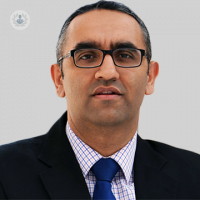Kidney stones: what to be aware of
Written in association with:Kidney stones are very common with more than 1 in 10 people getting stones at some stage in their lives. Anyone can get kidney stones but some people are more prone than others.
Smaller stones may be asymptomatic and can remain undetected, but larger kidney stones can lead to severe pain in the tummy, lower back or groin, which is typically felt on one side of the body.
Here, one of our leading London urologists Mr Rajesh Kavia explains when you should visit your doctor and how kidney stones can be treated.

What are possible risk factors for kidney stones?
Kidney stones are common in the warmer weather, generally due to dehydration, long haul flights and warm weather holidays can be contributory.
Certain medical conditions, such as diabetes, sarcoidosis, Crohn's disease or chronic urinary tract infection (UTI) can make it more likely for stones to form.
Why is the incidence of kidney stones increasing?
Studies have shown that the incidence may be increasing, however, the cause is unknown. Reasons may include more dehydrating environments but many people are drinking more nowadays.
What does a kidney stone feel like?
Kidney stones are extremely painful when they move from the kidney to the bladder via the ureter. The ureter is the tube that connects the kidney to the bladder, this is called ureteric colic. The pain is said to be worse than labour (by women), it is almost always on one side of the body and goes from loin to groin.
If the stone has travelled almost all the way out, some people may need to pass urine more often or get the urge to urinate. Kidney pain may occur in those where the stones are in the kidney and not moving.
When should you see a doctor?
The patient will need to see a doctor if the pain is severe. Often they will present to the emergency room. If the patient has a temperature and severe pain this can be a serious emergency.
How are kidney stones treated?
Stones may be treated by watching and waiting as a large proportion of smaller stones may pass on their own. Other stones can be managed with shock wave lithotripsy, ureteroscopy and LASER ( a camera is inserted via the urethra (waterpipe) to get to the stone and break it down. Some stones are directly approached via the kidney called percutaneous nephrolithotomy.
Mr Kavia is highly-experienced in treating kidney stones, urinary tract infection and bladder problems. Want his expert advice? Book an appointment here via his Top Doctor’s profile.


